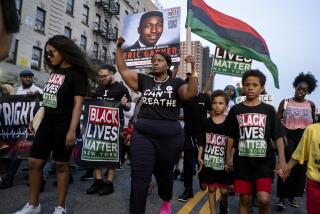Racial stereotypes can follow us to the grave, researchers say
- Share via
Can cause of death determine race?
In some cases, the answer appears to be yes.
When coroners and undertakers fill out death certificates, one of the pieces of information they must provide is the race of the deceased. That can be a somewhat subjective call, and one of the things that may influence an official’s perception of it is the particular way the person died, according to a team of sociologists from UC Irvine and the University of Oregon in Eugene.
They looked at data from 22,905 death certificates in the 1993 National Mortality Followback Survey, which compared information on official certificates to information provided by family members to see if it matched. In 1.1% of cases, family members said the racial classification on the death certificate was incorrect, the researchers found.
The surprising part was not the existence of errors but the pattern of those errors.
In the absence of any bias, those mistakes should have been randomly distributed among people of all races. Instead, the researchers found that the mistakes mirrored common stereotypes about Native Americans and blacks.
In the case of Native Americans, the stereotype involved alcohol abuse.
The researchers found that Native Americans were 2.6 times more likely than others to die of cirrhosis of chronic liver disease during the time period they studied. But the researchers used statistical methods to control for that fact, and they still found that people who died of cirrhosis were 2.9 times more likely to be identified as Native Americans on their death certificates. In fact, the more factors the researchers controlled for -- including income and place of residence -- the more the cause of death (cirrhosis) influenced the victim’s perceived race (Native American).
For African Americans, the stereotype in question was a propensity for violence.
During the period of the study, blacks were 6.6 times more likely than whites to be victims of homicide. But after taking that into account -- and even after controlling for the victim’s income, occupation and other demographic factors -- the researchers calculated that homicide victims were 4.4 times more likely to be perceived as African Americans than people who died of natural causes.
Similar patterns have been observed for other types of racial stereotypes. For instance, Americans who are unemployed, have ever been behind bars or live below the poverty line are less likely to be perceived as white -- even if they are.
The findings aren’t just unsettling -- they also undermine the accuracy of important data on disease and public health risks. “We conclude that stereotypes about who is likely to die a particular kind of death may color our official vital statistics,” the researchers wrote.
The study was published Wednesday in the journal PLoS ONE.
RELATED: Racial and gender stereotyping may spring from different roots







